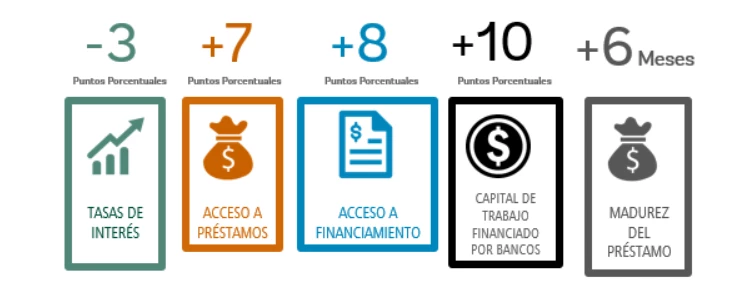
Aracelis owns a hair salon in Santo Domingo. Like all the other owners of the nearly 20,000 small and medium-sized enterprises (SMEs) in the Dominican Republic, she dreams about making her business thrive. SMEs in this Caribbean country employ more than 500,000 people, representing a key driver of economic growth. To make their businesses grow and achieve their goals, all business owners need one crucial ingredient: money.
The Global Competitiveness Report 2017-2018 lists limited access to finance as one of the 10 most problematic factors for doing business in the Dominican Republic. Small and medium-sized businesses do not usually own buildings or land, which financial institutions traditionally accept as collateral for loans.
For this reason, and under the leadership of the Ministry of Industry, Trade and SMEs (MICM), the country has taken an important step to reform its secured transactions system through a draft law submitted to Congress. This process has enabled the analysis of the commercial financing needs and opportunities of the country’s economic actors, with support from the Central Bank, the National Competitiveness Council, the Ministry of the Economy, Planning and Development, business and financial sector associations, among others. The World Bank Group and other multilateral organizations have also supported this reform process given its great potential for positive economic impact.
More financing, more growth
Secured transactions reforms have the potential to benefit SMEs. Currently, formal lending focuses on corporate or well-established borrowers and/or requires real property (buildings, land, etc.) as collateral. However, SMEs’ assets are concentrated in movable property —equipment, inventory, accounts receivable— to a ratio of almost four to one over immovable property. In order to address this issue, many countries have reformed or introduced a secured transactions law, collateral registries and enforcement mechanisms to optimize the use of movables as collateral.

The goal of the proposed reform in the Dominican Republic is to increase access to finance and foster sustainable growth for SMEs through broader involvement of the financial sector. This is attained by developing a modern legal framework, an online collateral registry, an effective enforcement system and by leveraging technology-based tools for financing.
To facilitate SMEs’ access to credit, the Draft Law on Secured Transactions would introduce four key improvements to:
- Allow the use of movable property as loan collateral, allowing present and future, tangible and intangible movables to serve as security for new credits.
- Create flexible contractual arrangements in which the rights and obligations of the lender and the borrower can evolve.
- Provide transparency into secured loans through a modern online collateral registry, and establish the priority of the original lender vis-à-vis concurrent or subsequent claims.
- Finally, in the event of default, provides for faster enforcement remedies as compared to current methods and procedures.
In addition to progress made, the country must adopt the law, implement an online collateral registry within the established period and create new credit products. The registry should include third party notice and establish a criterion based on the first-in-time, first-in-right rule with respect to movable collateral property.
Likewise, in order for the reform to reach its full potential, it will be necessary to ensure that procedural and extrajudicial remedies after default provide redress to lenders that have taken movables as collateral. This must be accomplished in coordination with the judicial branch to ensure that lenders are provided redress opportunities, in particular to tangible assets in the possession of secured debtors.
Once the law enters into force, and the collateral registry and enforcement remedies are in place, the regulator will be able to determine the eligibility of movables for risk-mitigation purposes. This will allow financial institutions to develop new credit products for SMEs using their movables as collateral, or increasing their level of acceptance.
With the adoption of this reform, the Dominican Republic will join other countries in the region that have modernized their secured transactions systems, including Colombia, Costa Rica, El Salvador, Guatemala, Honduras, Jamaica and Mexico.
At the regional level, in credit granted to SMEs. With the implementation of the secured transactions reform, Colombia rose 53 ranks to number two worldwide in the Getting Credit category of the Doing Business 2015 report. In the strength of legal right index indicator, Colombia obtained the maximum score. These results reflect a high level of protection of the rights of borrowers and creditors. Colombia’s collateral registry has been in operation since March 2014. To date, more than 30,000 SMEs have received financing with movable collateral. In Costa Rica, more than US$ 2.4 billion in loans have been granted with movable collateral, benefiting over 4,500 SMEs.
Accompanying the growth of SMEs
The ultimate goal of this reform is for SMEs to use their most valuable assets to access credit by eliminating weaknesses in the current secured transactions framework to close the gap between supply and demand of credit.
In order for the reform to reach its full potential, the next steps must be undertaken pursuant to international standards and best practices. This will ensure that the secured transactions system enables SMEs to grow, and will increase inclusive investment and competitiveness, thereby boosting the country’s economy.
The World Bank group commends the efforts of the Dominican authorities with this draft Law on Secured Transactions and acknowledges this major first step to improve its credit infrastructure and thus to stimulate the growth of the sector that will make Aracelis’s dreams come true.



Join the Conversation